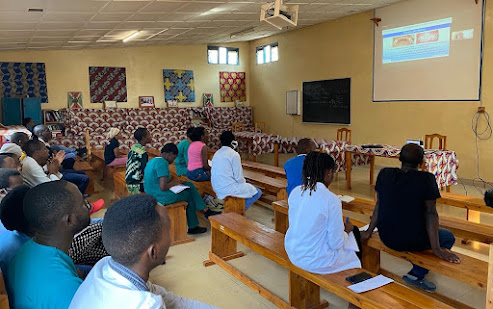(by Ted John)
A big part of our ministry in Burundi is medical education, a topic which has been previously written about and most recently here. A couple years ago, there was a major change in re-structuring the medical school curriculum such that med students would do nearly all of their clinical rotations at our hospital (whereas it was only about a third of their clinical time with us in previous years). Awesome! This continuity and increased face time had many positive implications, including more opportunities for building relationships at a deeper level and for medical education and discipleship.
Not surprisingly, this transition also came with some added responsibilities, including the organization and teaching of more coursework, much of which was previously taught elsewhere by others. Thus, there has been increased time and effort putting together resources, creating PowerPoint presentations, and organizing courses to fulfill the med school curricular requirements (especially if it’s the first time a course is being taught at Kibuye).
It makes sense that the pediatric course would be taught by pediatricians, and we are thankful that the knowledge and expertise was contained within teammates on site. It’s no small task to organize a 75-hour pediatric course! But what about the courses for which we don’t have the specialties represented here at Kibuye? For example, Cardiology, Psychiatry, ENT, PM&R, Dentistry, Ortho, and the list goes on. Well, nowadays with modern technology, it’s possible to do this creatively in the truest sense of tele-education and distance learning using a combination of audio and/or video recordings and live video conferencing, often in both English and French.
I am certain each course has its own story behind it, but I will share a little about my personal experience of how I (a general surgeon) ended up organizing a 2-week, 15-hour dental course (“cours de stomatologie” in French), implemented and completed in December 2021.
 |
| Med student courses are usually taught in the hospital chapel |
Back in August 2021, not long after I returned to Kibuye, I
remember having a conversation with one of our teammates about how the dental
course had been postponed due to the challenge of finding instructors. Then I
thought about my dentist friends in the U.S., many of whom I had befriended when
I was a med student at the University of Michigan (which also has an excellent
dental school!). So, I contacted some of these friends (big thanks to Amy, Dave, and Ben), who all expressed
interest in being part of the development of this course.
What went into putting this course together? In a nutshell,
these were the major steps that occurred during the subsequent 3 months (in
mostly chronological order):
- Determine educational content based on provided learning objectives and context
- Organize the material into 1-hour lecture blocks
- Divide work amongst presenters
- Create PowerPoint presentations
- Translate English slides into French, if applicable
- Pre-record each presentation as a video, in French if possible
- Write quiz/test questions for each lecture (and translate into French)
- Coordinate selected lectures over live video conferencing (Zoom) over different time zones
- Proctor, grade, and submit results of quizzes and final exam
 |
| Dr. Ben Kang giving a lecture on inflammatory diseases of dentistry over live video conferencing (Zoom) |
 |
| Dr. Dave Chiu giving a lecture on the temporo-mandibular joint |
I also gained some cultural insights about teeth and dental
care in Burundi. For example, have you ever thought about what people in other
countries and cultures do with their baby teeth? Most Burundians apparently
throw it under their legs (described to me in the manner of hiking a football)
and say the phrase, “nyamanza tora iryinyo ryawe unsubize ryanje ryiza,” which
rougly translates as “a small bird will take your tooth and give you another
(permanent tooth) that’s better.”
While I was glad when the course was over, it was definitely meaningful and worthwhile to be able to be part of teaching and equipping these future medical doctors with basic dentistry knowledge. Since it was the first time teaching this course, there was more upfront time and energy invested in content creation. But in future years, we should be able to use the same didactic content, and focus our attention instead on how to make the course better.
 |
| Group photo with all 46 students at the end of the course |
What’s next? Well, there's actually a 45-hour "synthesis" course already underway, which is being coordinated by Eric and taught by many of our teammates. After that, I'll be coordinating a new 45-hour trauma / orthopedic course, currently being prepared for a tentative start date in mid-February. It’ll be a bigger undertaking than the dental course, but thankfully we have a French textbook as a reference and 5 surgeons involved (one of whom is an orthopedic surgeon who will be visiting Burundi at that time).
Looking back at my own med school days, I can say that I took the courses and the quality of education for granted. Funny how God is using my role as an educator now to give me a new perspective and deeper appreciation for anyone and everyone involved in medical education.







